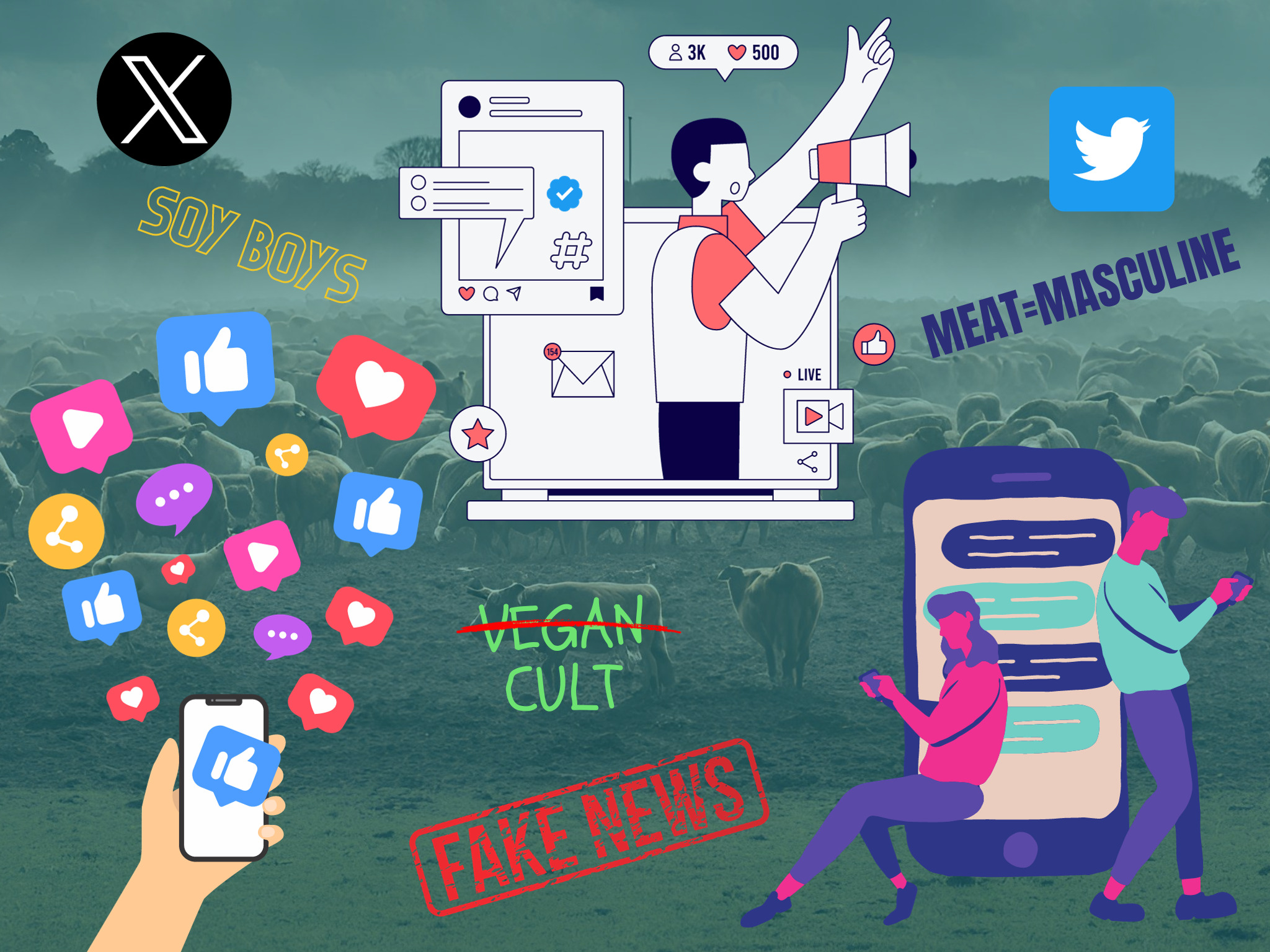Meat & Misinformation: How Social Media Conspiracy Campaigns Are Fueling The Fight Against Alt-Protein
7 Mins Read
An analysis of 285 million posts on social media has shown how conspiracy theories, junk science, and pro-meat and -dairy posts are driving a misinformation campaign against climate-friendly food and alternative proteins. Here are 12 striking facts and takeaways.
Commissioned by the non-profit Changing Markets Foundation, the largest-ever analysis of online meat and dairy misinformation has revealed how nearly a million misleading posts attacked figures and organisations like Bill Gates and the World Economic Forum (WEF), scientific findings about the effects of animal agriculture on the environment, and the health and climate benefits of plant-based and cultivated proteins.
Swiss data firm Ripple Research analysed 285 million social media posts – mostly on Twitter/X, but also on Reddit and other blogs and forums – and found that 948,000 either bent the truth about meat and dairy, or attacked veganism and alternative proteins, in an effort that has drawn comparisons to big oil misinformation.
It comes just a day before world leaders will convene at COP28 in Dubai, which will be the UN’s first food-centric climate summit and serve mostly meatless food: “We traced online attacks on alternative proteins and posts that exaggerate the benefits of meat and dairy directly to industry and its representatives,” said Changing Markets Foundation senior campaigner Maddy Haughton-Boakes.
“A large volume of conspiracy theories and culture war content about food and farming came from those on the political far-right rather than industry. But the two have a shared agenda, to downplay the science and weaken regulation. This ultimately maintains and even enhances the status quo of high meat and dairy consumption with low regulation.”
Here are 12 striking facts from the investigation:
1. 78% of posts went on the attack against veganism and science
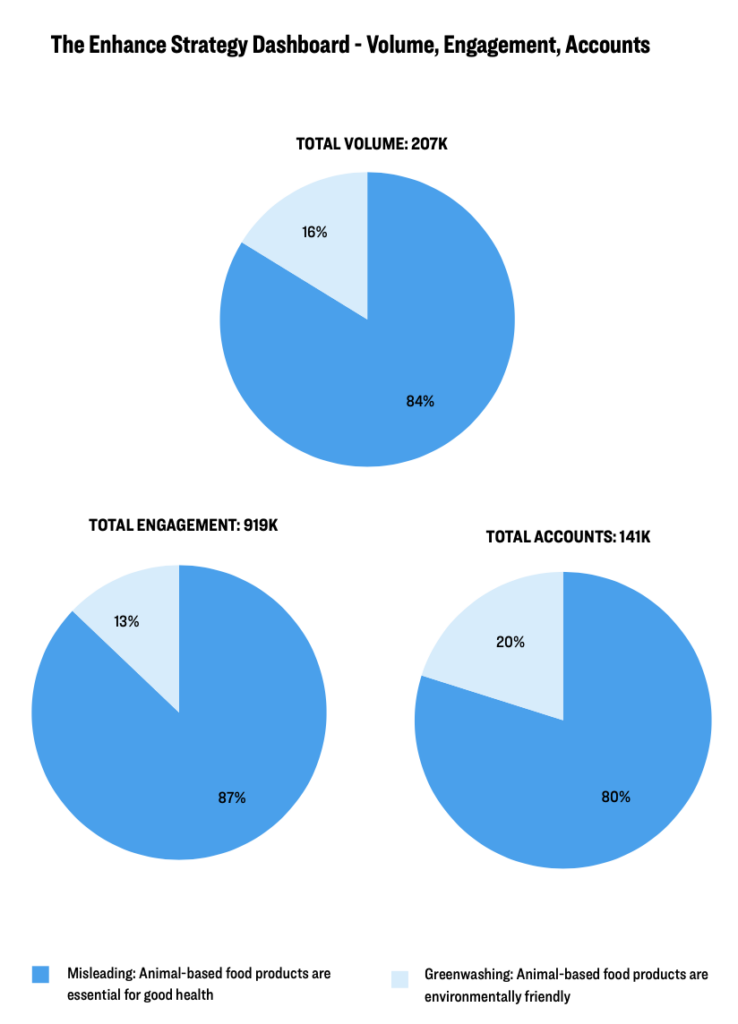
Over three-quarters (78%) of the misinformation posts were classed as ‘disparaging’, which involves narratives to discredit plant-based food and attack scientific research about the negative impacts of meat and dairy.
2. Conspiracy theories against ‘The Great Reset’ reigned supreme
A total of 37% (350,465) of posts were heavily conspiratorial, projecting that the global elite planned and managed the Covid-19 pandemic to bring down the global economy and establish a socialist world government. These theories still exist, and connect climate, food, and agriculture choices to a scheme to weaken humanity and maintain control.
3. WEF and Bill Gates were frequent misinformation targets
Many posts about The Great Reset suggested a coordinated effort to enforce radical dietary change to transform people into weakened, ‘diseased subjects’ by bodies like the WEF. Climate and diet-related legislation were reframed as extreme measures to eliminate certain ways of life, with figures like Klaus Schwab, John Kerry, Jacinda Ardern, and Bill Gates highlighted. The latter was accused of tampering with livestock, injecting cattle with mRNA shots, and engineering artificial food shortages to promote the consumption of cultivated meat and induce illnesses.

4. 24% of posts maligned alt-proteins as unhealthy
Almost a quarter of posts (223,389) attacked plant-based and cultivated meat and dairy as ultra-processed “Frankenfood” that lack nutrition and can cause serious diseases and “turbo cancers”. This included attacks on long ingredient lists, over-processing, nutritional aspects, and diseases and health effects.
5. 7% denied climate change or the environmental impact of alternative proteins
A total of 69,045 posts (7% of the total) attacked climate science. This involved denying climate change as a hoax perpetrated by ‘vegan extremists’, comparing the environmental impact of almonds (use of water and bee population decline) or soybeans (deforestation and monocropping) with locally produced animal products to discredit plant-based food, and undermining climate policies like net zero. Meanwhile, 13,388 posts questioned scientific findings on the climate, environment and health benefits of reduced meat and dairy.
6. A non-peer-reviewed UC Davis study about cultivated meat with dubious claims became fodder
In May 2023, the University of California, Davis released a pre-print, non-peer-reviewed study claiming that cell-cultured meat is 25 times worse for the environment than beef – something much of this anti-alt-protein narrative centred on. But the institution is a “well-known Big Ag conspirator“, and this work has been heavily criticised.
7. ‘Soy boys’, meat and masculinity fuelled the culture wars
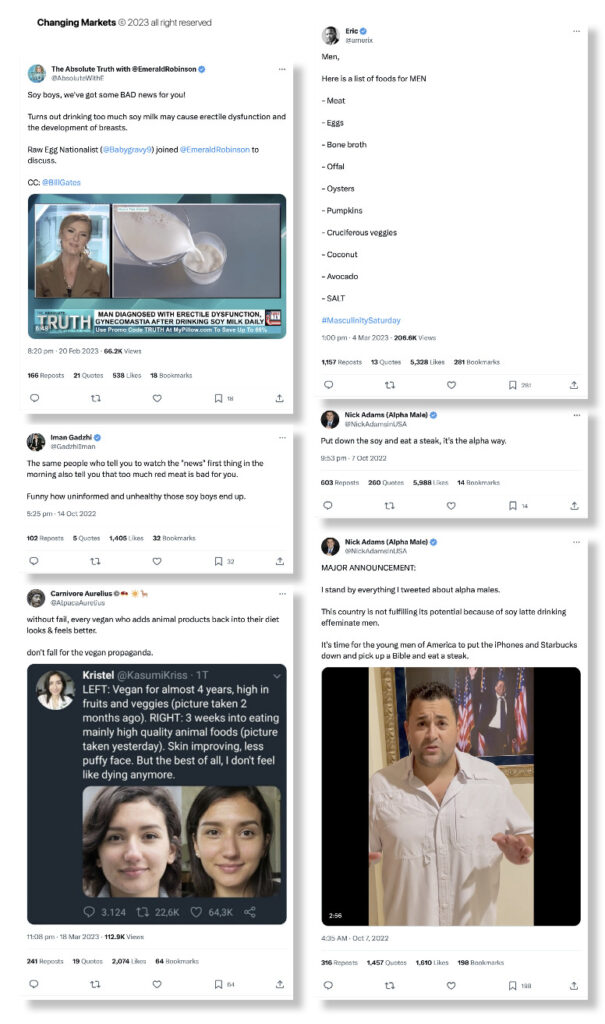
83,790 posts (9%) had a culture war aspect, presenting meat as an identity wrapped in an ‘anti-elite’, ‘us versus them’ ideology. This included targeting vegan men with the derogatory term ‘soy boys’ (related to claims that phytoestrogen in soy products can ‘feminise’ men), labelling vegans as part of a cult, and associating meat with masculinity and traits like fertility and strength.
8. More posts slammed alt-protein than promoted meat and dairy
The report’s authors found the level of hostility against alt-protein – numbering 292,434 posts (31%) – surprising, as they had expected that the majority of posts would promote meat and dairy. But only one in five (207,669 or 22%) did so – these were classed as ‘enhancing’, touting the health (termed ‘healthwashing’) and eco credentials (greenwashing) of meat and dairy.
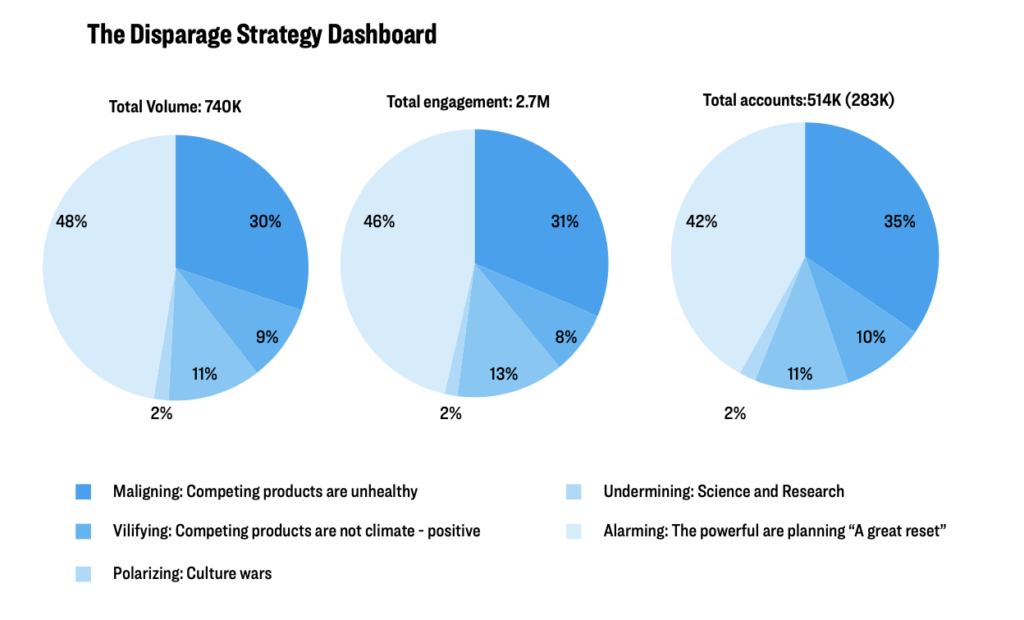
9. Online posts portrayed meat and dairy as nutritionally superior
173,971 posts (18%) centered around the perceived health benefits of meat and dairy, with slogans like “no need to fear red meat” to drive more consumption and claims such as “animal-based diets meet all nutrient needs”. This weaved in the ‘meat is masculine’ narrative too, and countered negative associations with meat consumption. Trends like the carnivore diet, extreme meat intake, and the #meatheals movement (asserting that meat can cure diseases instead of medicines) were also on the up.
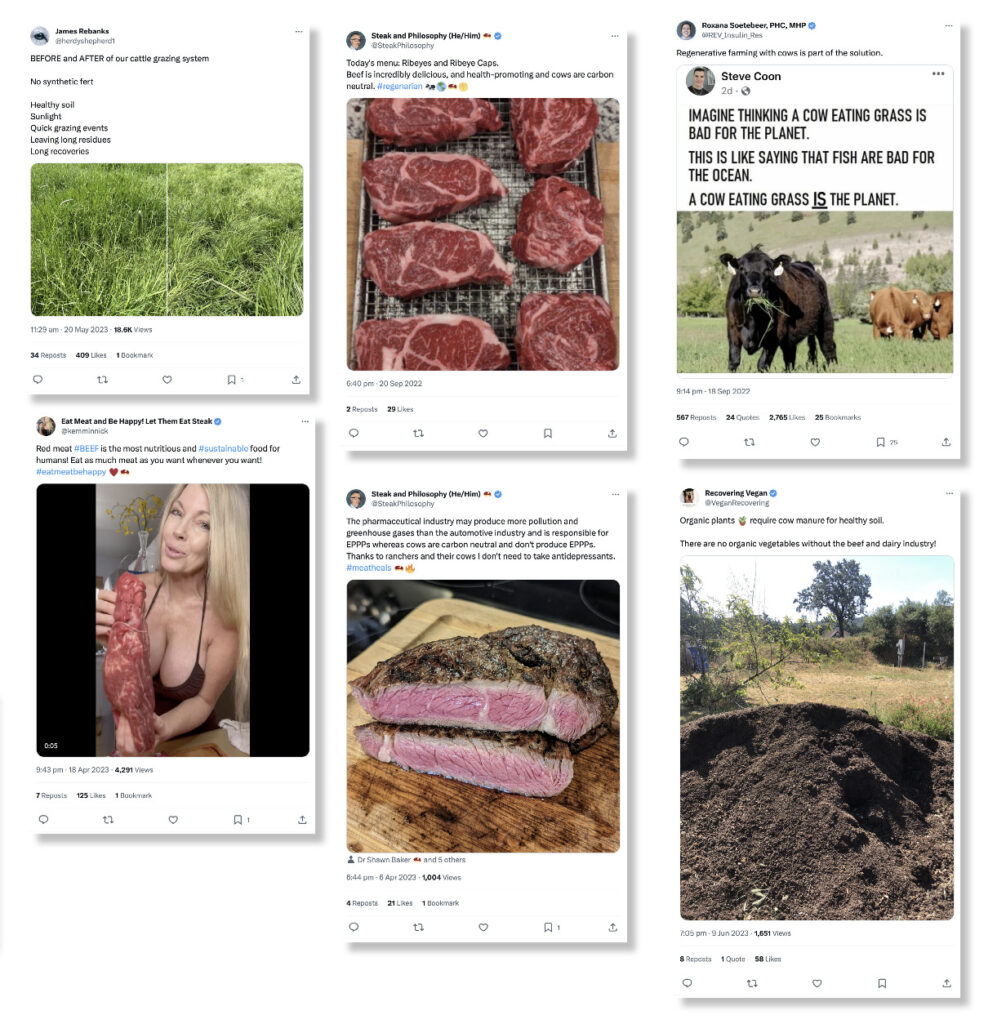
10. Greenwashing attempts added to the narrative
The report says it’s notable that there is a lack of emphasis or positive discussion on the environmental impact of meat and dairy, with only 33,698 posts (4% of the total) doing so. These posts alleged that cows are carbon-neutral and don’t contribute to climate change, used regenerative agriculture as a way to minimise livestock’s climate impact, asserted that livestock supports biodiversity, and bemoaned “unfair targeting” of cows and farmers.
11. 50,000 accounts drove 3.6 million online interactions around meat misinformation
All the posts analysed came from an army of 425,226 real and bot accounts, but only 50,000 drove all the 3.6 million likes, shares and comments. And half of all these came from 50 accounts, which included famous right-wing commentators and politicians.
12. Cabot Philips and @iluminatibot are the most influential misinformation spreaders
Cabot Phillips, an editor at US conservative news site The Daily Wire, and @iluminatibot, an anonymous account that promotes Illuminati conspiracy theories, generated 186,843 and 186,101 likes, comments and shares of misleading posts, respectively. Other influential accounts include figures like Tucker Carlson and Donald Trump Jr, as well as self-proclaimed medical experts like @DrLoupis, @amerix and @SBakerMD. Junk science posts were a regular theme.

Misinformation will undermine COP28 food outcomes
The report is deliberately timed to publish just ahead of COP28. The authors say policy restraint is casting a shadow over global climate talks: while COP28 hosts, the UAE, want governments to incorporate food and agriculture into their national climate plans, it’s unclear if all will sign in time for the Leaders Summit on December 1. December 10, meanwhile, will be a first-ever food day, where the FAO is set to highlight the overconsumption of meat in rich countries, and set out a roadmap to 1.5°C.
But the FAO itself has been embroiled in controversy surrounding misinformation about meat and dairy. It was subject to an investigation that revealed it censored and undermined work by its own officials on the methane emissions caused by the animal agriculture industry, following pressure from livestock lobby groups. Further, there are concerns about the continued decline of the FAO’s estimate of livestock methane emissions, which was calculated to be 18% in 2006, then changed to 14.5% in 2013, and is now cited at 11.2%. Other research puts this number at 20% or between 16.5-28.1%.
Similarly, the EU was revealed to be in cahoots with animal lobby groups as well, which pressured the bloc to walk back a proposed ban on the caged farming of animals like hens and pigs, which has since been put on hold.
Such misinformation campaigns are hugely detrimental to a planet that is on course to reach 3°C warming above pre-industrial levels, which will spell catastrophe around the globe. For COP28, it’s imperative that misinformation is a priority in its food-focused avatar.


